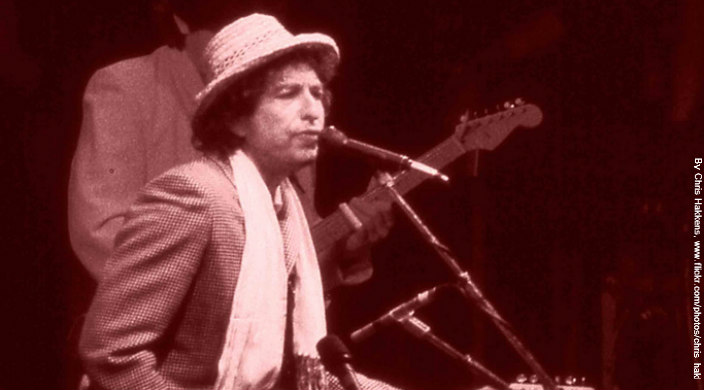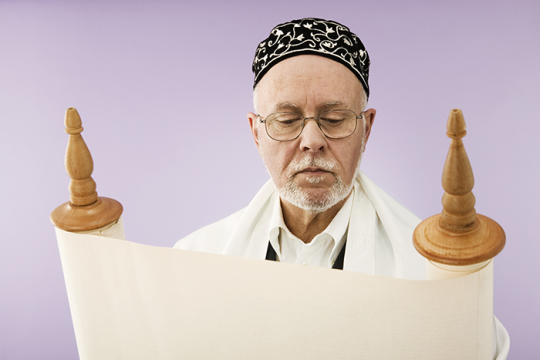
This week, musician Bob Dylan was awarded the Nobel Prize in Literature for ushering in a new era of poetic songwriting, blending strains of poetry, philosophy, and theology. John Lennon wrote of Dylan’s influence, “Hearing Bob Dylan allowed me to make the leap from writing empty pop songs to expressing the actuality of my life and the depths of my own soul.”
The man who would become Bob Dylan – Robert Allen Zimmerman – was born in on May 24, 1941 and raised in the mostly Catholic town of Hibbing, MN. His mother, Beatty Stone, a native of Hibbling, married shop owner Abraham Zimmerman, the son of a peddler and shoemaker who emigrated from Russia to the U.S. in the 1920s. “When I was young, my life was built around the family,” Dylan recalls. “We got together all the time. There weren’t many Jews around.”
Dylan found a Jewish community in the summers at Herzl Camp in Webster, WI. He learned Hebrew and studied the Torah privately with a rabbi brought in to tutor him for his bar mitzvah.
His first musical hero was Hank Williams, whose classic country songs inspired him to write his own tunes. By age 12, Dylan knew he would be a musician. “I was never gonna be anything else, never,” he told me.
Dylan moved to New York at age 20 and two years later released his debut album, Bob Dylan, which contained only two original songs, one of them a tribute to folk legend Woody Guthrie. His second album, The Freewheelin’ Bob Dylan (1963), featured 13 original songs, including classics such as “Blowing In The Wind” and “Masters of War.” Dylan imbued himself with an air of mystery, and though he wrote protest songs in the ‘60s, he refused to be labeled as a “protest” singer.
While it was not unusual for a Dylan song to include biblical imagery in his songs, rarely did he reference Jewish rituals, with the exception of “Gates Of Eden” from Bringing It All Back Home (1965):
… As he weeps to wicked birds of prey
Who pick up on his bread crumb sins
And there are no sins inside the Gates of Eden
According to Dylan scholar Larry Yudelson, “bread crumb sins” refers to Tashlich, a ceremony at the beginning of the new year in which Jews throw crumbs into a body of water to cast out their sins
In 1966, Dylan withdrew from public life after a serious motorcycle accident. Living in Woodstock, N.Y., with his wife Sara and their children, he began to explore his Jewish roots, triggered perhaps by the death of his father. Dylan traveled to Israel and considered settling on a kibbutz.
His next album, John Wesley Harding (1968) had no fewer than 61 biblical references. “All Along the Watchtower” reflected imagery from Isaiah 21:5: “Set the table! To let the watchman watch.”
In the late ’70s, Dylan found Christianity, which took musical form in his 1979 album Slow Train Coming, featuring songs about Christ, such as “When He Returns” and “I Believe In You.” His next studio album, Saved (1980), remained in the Christian mode, but one of the songs, “Every Grain Of Sand,” led some Dylan watchers to speculate that he was returning to the Jewish fold:
Don’t have the inclination to look back on any mistake
Like Cain, I now behold this chain of events that I must break,
In the fury of the moment I can see the Master’s hand
In every leaf that trembles, in every grain of sand.
In 1982, Dylan and his son traveled to Israel to celebrate Jakob’s bar mitzvah. The inside cover of Dylan’s subsequent album, Infidels, included a photograph of the Mount of Olives overlooking Jerusalem. Although Infidels’ lyrics still alluded to the New Testament, Dylan’s attention had turned to the historical travails of the Jewish people, as in the song “Neighborhood Bully.”
When asked in a 1985 Rolling Stone interview about his “Christian period,” Dylan responded, “Whether you want to believe Jesus Christ is the Messiah is irrelevant, but whether you’re aware of the messianic complex, that’s all that’s important.…People who believe in the coming of the Messiah live their lives right now as if he was here.” Dylan’s fascination with “the messianic complex” may explain his attraction to the Lubavitchers, a Hasidic group that strives to hasten the coming of the messiah.
Bob Dylan’s pride and faith lie primarily in the supreme achievement of inspired songwriting. He commingles the linguistic beauty of Shakespeare, Byron, and Dylan Thomas (whose name he adopted); the expansiveness and beat experimentation of Ginsberg, Kerouac, and Ferlinghetti; and the folk poetry of Woody Guthrie and Hank Williams. His music emerges from a personal terrain, allowing him to explore poetic and philosophical possibilities and establish a greater sense of intimacy between himself and his audience.
Paul Zollo, a Jewish songwriter-singer, is author of Songwriters on Songwriting and Hollywood Remembered (Cooper Square Press).
Related Posts

Dear Israel: A Story of Love and Longing

Becoming B’nei Mitzvah at Any Age
